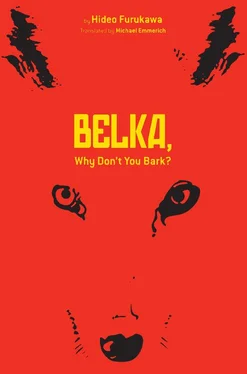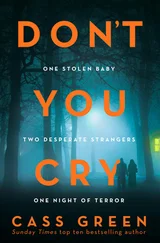Hideo Furukawa - Belka, Why Don't You Bark?
Здесь есть возможность читать онлайн «Hideo Furukawa - Belka, Why Don't You Bark?» весь текст электронной книги совершенно бесплатно (целиком полную версию без сокращений). В некоторых случаях можно слушать аудио, скачать через торрент в формате fb2 и присутствует краткое содержание. Город: San Francisco, Год выпуска: 2012, ISBN: 2012, Издательство: Haikasoru, Жанр: prose_magic, Современная проза, на английском языке. Описание произведения, (предисловие) а так же отзывы посетителей доступны на портале библиотеки ЛибКат.
- Название:Belka, Why Don't You Bark?
- Автор:
- Издательство:Haikasoru
- Жанр:
- Год:2012
- Город:San Francisco
- ISBN:978-1-4215-5089-3
- Рейтинг книги:4 / 5. Голосов: 1
-
Избранное:Добавить в избранное
- Отзывы:
-
Ваша оценка:
- 80
- 1
- 2
- 3
- 4
- 5
Belka, Why Don't You Bark?: краткое содержание, описание и аннотация
Предлагаем к чтению аннотацию, описание, краткое содержание или предисловие (зависит от того, что написал сам автор книги «Belka, Why Don't You Bark?»). Если вы не нашли необходимую информацию о книге — напишите в комментариях, мы постараемся отыскать её.
https://www.youtube.com/watch?v=ay_DcZ6RDFA https://www.youtube.com/watch?v=Orvqrqjk9pU
Belka, Why Don't You Bark? — читать онлайн бесплатно полную книгу (весь текст) целиком
Ниже представлен текст книги, разбитый по страницам. Система сохранения места последней прочитанной страницы, позволяет с удобством читать онлайн бесплатно книгу «Belka, Why Don't You Bark?», без необходимости каждый раз заново искать на чём Вы остановились. Поставьте закладку, и сможете в любой момент перейти на страницу, на которой закончили чтение.
Интервал:
Закладка:
You were underground then, in the fourth layer.
You, DED, felt the first layer collapse.
Overhead.
For a moment, you lost consciousness. You and the red dogs—there had only been one in the beginning, but somewhere along the way a second had joined the chase—who had pursued you down from the second layer to the third, then finally to the fourth, slammed your heads against the tunnel’s hard rock floor and earthen walls as the jolt of the explosion rocked it. This wasn’t part of the limited bombing that had been requested. This was a separate battle that had started at the same time, and the offensive and defensive maneuvers associated with it would continue for three hours without rest on the ground, over a range of four thousand feet above and below the McNamara line. Two observation towers still under construction were toppled. More than seven hundred sandbags were catapulted into the air. An electrified fence, torn in places, zipped and zapped. Some thirty-three thousand cartridge cases were scattered. Soldiers’ limbs were airborne, then dotted the ground. It was impossible to judge how many humans had been wounded, because of course there were left and right arms, and right and left legs. The earth itself was a wave transporting an unusual sort of surfer: the McNamara line, with the wooden barriers that had been built to conceal it as its surfboard.
Part of the earth, that is. A tidal wave.
The world crumbled.
And then, eventually, you awoke.
You had lost consciousness for only a moment, but the past was severed from the present. Did you know what had happened, DED? You’d been buried inside the earth. The entrance—which is to say, from your perspective, the exit—had been closed. Not all the entrances/exits to the vast network of underground tunnels, of course, but all the entrances/exits to the fourth layer, where you were. Just a few moments ago, there had been two vertical openings through which you could drop down into, or climb up out of, the fourth layer. Only two. Now there were none.
Part of the first layer had crumbled. This caused the collapse of the second and the third. And then.
The vertical openings were closed. Lost.
So three dogs were buried alive in the ground in the general area of the seventeenth parallel north, the DMZ, in the fourth layer.
Not just in the ground, but under it.
Three dogs, not just you. That fact would soon become clear.
You awoke.
In the beginning, there was darkness. AM I BLIND? You had just suffered a concussion and your judgment was unsound, you became anxious. But no, DED, you weren’t blind. You were in a place that rendered your eyes useless. Pain wracked your body. You had been bashed, you were covered with scrapes. OH, IT HURTS, IT HURTS, you whimpered. And your whimpering echoed off the rock floor and the hard walls of packed earth. OOOHHH, it echoed. IIT HHUURRTTSS, IIT HHUURRTTSS. You had no way of knowing this at the time, but over the next few weeks you would acquire more and more of these bruises. WHERE AM I? you thought. WHAT AM I?
IIIT HHHUUURRRTTTSSS! your echo said.
After that, you kept quiet.
There were enemies.
In the beginning there was darkness, and then there were your enemies. I’M UNDERGROUND, you recalled. AND I’M AN AMERICAN DOG. AN ELITE. I’M PROUD OF WHAT I AM.
Your enemies, too, kept quiet.
You caught a whiff of something awful. Your eyes might be useless, but you were still a dog. Your nose rendered you omniscient. After all, you weren’t just any dog, you came from a special line of German shepherds that was the pride of the US military, and you had gone through a rigorous screening process in California, and then again on Okinawa. I’M A TOP-CLASS MILITARY DOG! I’M THE PRIDE OF AMERICA! Something stank. Two enemy dogs.
IT’S THEM.
THE SAME KIND. GERMAN SHEPHERDS.
Two of them.
Something stank. You knew what it was. One of them was injured. One of them. And the other… was frightened? But it wasn’t simply frightened of you. The evolving situation itself had stunned that red dog. But such excuses were meaningless. The point was that from that moment on, the two dogs dropped into the weaker position. And you, as a result, ascended to the anti-weak position.
You had power now.
Their fear empowered you. You: DED.
You bristled with a murderous strength. They moaned. Both of them.
Incapable of enduring the silence any longer, they started barking. ARE YOU FRIGHTENED?
YOU… ANTI-AMERICAN DOGS.
Next you attacked them. You did it in a flash, with no warning. In no time at all you had closed the distance between you and them, taken aim at the wounded dog, buried the deadly weapons in your jaw into its flesh. The other dog scampered away, crouched in a posture that made a counterattack unthinkable, its tail literally between its legs. You didn’t pursue. This was a strategic decision. You were unaccustomed to this darkness. This closed network of tunnels was a whole new world. You mustn’t be rash.
EXPLORE, you told yourself. FIGURE THIS PLACE OUT.
Unsteadily, uncertainly, you began. This world had only just been born.
A step forward. Ten steps forward. Three forks in the tunnel. It took an hour to get that far. You returned to where you had started. The dog you had toppled wasn’t yet completely dead. It was teetering at the edge of death, but still breathing.
You lay down beside it to rest.
And then?
Two hours had passed, and you were worn out. You were getting hungry. There was nothing to eat. Where was the food?
There.
You could eat that, right?
You tore into the red dog’s stomach. You made that last breath he had taken his last breath. In the beginning there was darkness, and then there were your enemies. And then you were hungry. And so you did it.
This was a world with new rules. You became a moral being. Yes, DED. You consumed the body. Flesh of your flesh. You couldn’t have grasped it, but that meat was… a distant relative. A pure German shepherd that traced its ancestry back to Bad News.
And so you lived, and you had one less enemy.
You hadn’t yet noticed that five of your fellows had ended up underground as well. They, too, had no way out. And more enemy dogs as well: six in all, including the two the officer in the North Vietnamese Army had ordered into the tunnels. Except that now one of those red dogs was gone.
Six vs. five.
What’s going on here? What is this?
Sino-American conflict. The direct confrontation that both sides had been avoiding was now taking place, here on the Indochina peninsula. Happening on the ground—indeed, not just on the ground but under it, several layers down. A Vietnam War of the dogs.
The next day—although there was really no basis for speaking of one day or the next as there was nothing to mark the passage of time—you discovered one of your fellows. She was dead. She had stumbled into a tiger trap. This was a brutal sort of contraption consisting of sharp bamboo spears angled up from the bottom of a hole, meant to kill “American imperialists.” There were a few in the fourth layer that targeted the US military’s underground combat specialists, so-called “tunnel rats,” who would be lured in and disposed of.
Five vs. five.
You inspected the tiger trap. Not by sight, since you could hardly see anything. By sniffing and touching. And then you hauled your fellow’s body up out of the trap, one chunk at a time, and ate it.
Over the course of the next year, the remaining dogs dedicated themselves to a slow process of subtraction. Four vs. five. Four vs. three. Two vs. two. On average, one dog died every two months. In the second week, DED, you and your fellows came together to form a pack. Your enemies did the same. Some dogs were able to adapt to this sunless new world, and some dogs were not. The red dogs, the Chinese dogs whose affiliation had been concealed, had already acquired a close familiarity with the network of tunnels—they remembered its structure; carried, as it were, a mental map in their heads—and so they realized that the entrances/exits to the fourth layer had been closed off, and they despaired. Or else they were thrown into confusion by the shock of what had happened. THE MAIN TUNNEL THAT HEADS OFF TO THE RIGHT HAS COLLAPSED! AND SUDDENLY A BRANCH… THERE’S A NEW BRANCH HEADING OFF TO THE LEFT! You and your fellows knew nothing of this loss. You were not tormented by the anguish that consumed your enemies. You knew it: THERE IS THE FIRST STEP. ALWAYS, ALWAYS. Again and again you pounded this instinct into your brain. You took one step at a time, and before you knew it you had taken ten steps, a hundred steps. YOU UNDERSTAND? you asked your fellows. GO ON, BUT GO CAREFULLY, you commanded your fellows.
Читать дальшеИнтервал:
Закладка:
Похожие книги на «Belka, Why Don't You Bark?»
Представляем Вашему вниманию похожие книги на «Belka, Why Don't You Bark?» списком для выбора. Мы отобрали схожую по названию и смыслу литературу в надежде предоставить читателям больше вариантов отыскать новые, интересные, ещё непрочитанные произведения.
Обсуждение, отзывы о книге «Belka, Why Don't You Bark?» и просто собственные мнения читателей. Оставьте ваши комментарии, напишите, что Вы думаете о произведении, его смысле или главных героях. Укажите что конкретно понравилось, а что нет, и почему Вы так считаете.












